Slovenian PM Supports Croatia's Schengen Entry
ZAGREB, 26 May, 2021 - Slovenian Prime Minister Janez Janša on Wednesday supported the Schengen entry of Croatia, Bulgaria and Romania as it would strengthen security in Europe.
We support Croatia's entry to the Schengen Area, as well as the entry of Bulgaria and Romania. We believe those are steps that strengthen security in Europe, he told a joint press conference with European Parliament President David Sassoli.
He spoke at the press conference via video link from Ljubljana after presenting to European Parliament leaders the priorities of the Slovenian presidency of the Council of the EU, which starts on 1 July.
Croatian PM Andrej Plenković said in Brussels on Tuesday he expected Croatia's Schengen membership could be on the agenda during the Slovenian presidency.
"Croatia is on the right track to become a member of the Schengen Area in 2022 and then to enter the eurozone. I think that's possible. When we look at the very good relations we now have with Slovenia, it would be a great scenario if something like that happened during Slovenia's presidency of the Council of the EU," he told the press.
Janša today also supported EU enlargement to the Western Balkans, saying many problems there, including the border issue, would be taken off the agenda with the accession of those countries.
EU enlargement is in our common interest. It should be our strategic response to numerous challenges, he added.
He said that when the EU was dealing with the financial and then the migrant crisis, neglecting enlargement, some other factors started expanding their influence in the Western Balkans.
Those foreign factors don't have the same values as we in the European Union, he added.
Janša said a European perspective was the answer.
We can solve problems by making borders less important. Slovenia is now part of the European Union and Schengen, where there are no physical borders, he added.
He announced an EU-Western Balkan summit for 6 October in Slovenia.
As for the priorities of Slovenia's EU presidency, Janša highlighted respect for the rule of law and EU resilience to crises. He also underlined the importance of the Conference on the Future of the EU, which will end next year during the French presidency.
For more about diplomacy in Croatia, follow TCN's dedicated page.
JANAF, OMV Sign First Oil Storage Contract
ZAGREB, 26 May, 2021 - The JANAF oil pipeline and storage system said on Wednesday it had signed its first contract with Austria's OMV Supply & Trading Ltd for storing up to 99,000 cubic metres of crude oil at the Omišalj Terminal for a period of two years.
Management said the contract confirmed JANAF's strong export orientation, adding that the company generated over 60% of its revenue from foreign clients.
The new contract ensures the further use of our storage capacity and stable business in the longer term, Management Board chairman Stjepan Adanić and Board member Vladislav Veslica said.
For more about diplomacy in Croatia, follow TCN's dedicated page.
Friends of Croatia: UNICEF - Croatia an Example to the World When it Comes to Breastfeeding
May 27, 2021 - The sixth article in the "Friends of Croatia: UNICEF" series explores the work of the UNICEF Office for Croatia. What is done regarding children's rights in Croatia, positives, and negatives, and how can you help if you want to?
To ensure that our world even stays the same, let alone improves, new generations are essential. But, before they grow old enough to participate in society, society must first take care of the youngest ones to grow and develop. Society must ensure for kids that they grow up in families filled with love, make sure that kids can go to school, that they are healthy, safe from violence, that they are not hungry or thirsty, and give them overall opportunity to make it in the world.
Basically, children have rights, and they are in more detail elaborated in 54 articles. For more details, have a look at the Convention on the Rights of the Child that came to power on September 2, 1990, by the United Nations (UN) General Assembly.
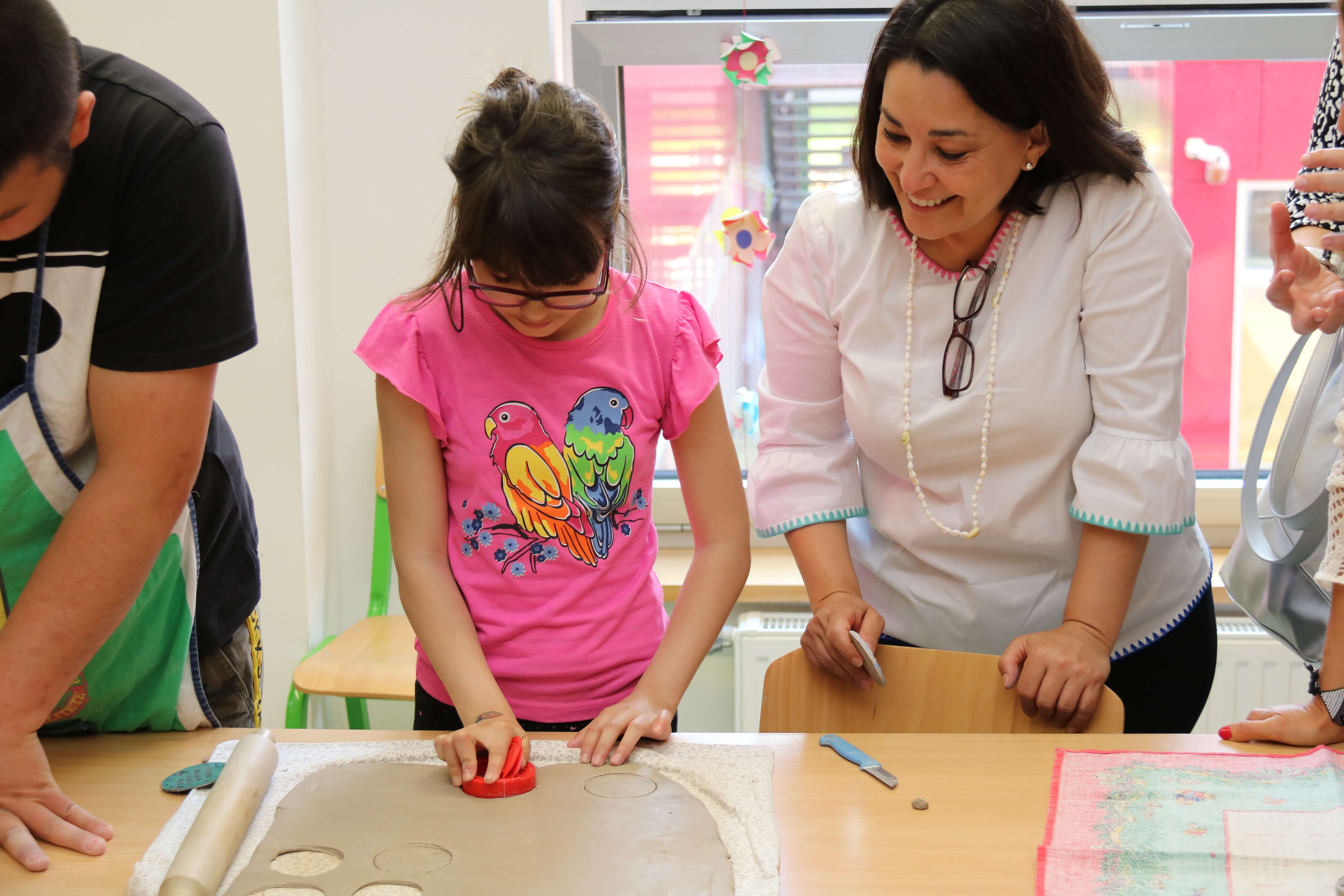
Regina M. Castillo, UNICEF office for Croatia representative with children with disabilities in Centre Tomislav Špoljar in Varaždin © Marin Ilej/UNICEF
The UN is dedicated to seeing this Convention is being respected, and United Nations International Children's Emergency Fund, commonly known as UNICEF, specializes in the issues of children's rights. Established in the aftermath of World War II, UNICEF has been at the frontlines of humanitarian crises, armed conflict, and natural disasters.
„Undeterred by the scale of the crises, we rise to the challenge, reimagine what is possible and respond by helping millions of children survive and thrive. Our on-the-ground expertise has reached more than 191 countries and territories, through committed partnerships and a passion for innovation“, says UNICEF on its official website.
Croatia signed and agreed with the Convention, and UNICEF today has its own office in Zagreb. Furthermore, it's worth noting that UNICEF has existed for 75 years, and despite firstly coming to Croatian territory while the country was part of the former Socialist Federal Republic of Yugoslavia, UNICEF has been with Croatia since the organization was established.
„Many people do not know that UNICEF helped to eradicate malaria in Croatia and that UNICEF played a key role in the development of modern dairy. Dairies were built in Zagreb, Rijeka, and Split, and factories for the production of powder milk in Osijek and Županja. Milk was distributed in schools, and for many children, it was their only meal during the day“, says Regina M. Castillo, UNICEF Office for Croatia representative.
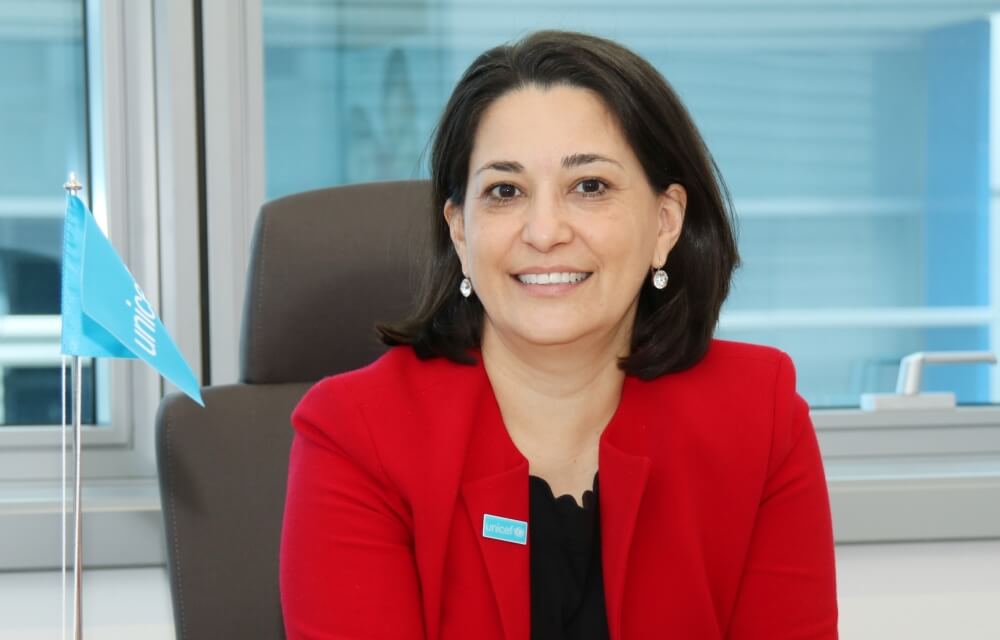
Regina M. Castillo, UNICEF office for Croatia representative © Marin Ilej/UNICEF
The UNICEF representative is elected for a five-year mandate, and Regina M. Castillo came to her function in Croatia in 2019. Her career in the UN started in 2001 and was in charge of economic and social questions in the Executive Office of the UN chief secretary Kofi Annan in New York. This was followed by Castilla moving to work in the mutual program for HIV/AIDS, known as UNAIDS. She was first the director of private sector partnerships in Geneva (2006-2012) and then moved to be the director for Bolivia, Ecuador, and Peru (2012-2015). She majored in International relations and public politics.
Born in Nicaragua, she first started her career in the 1990s as a diplomat, and she was also the headmistress for international trade in the Nicaraguan Trading Ministry.
Helping Croatia before it was cool (or an independent country)
Castillo went on to continue that after World War 2, UNICEF fed six million children every day, which included many children in Croatia.
„One of those children was our dear colleague, prof. Josip Grgurić, who is still working tirelessly for the youngest. He still remembers the yellow cheese that was part of UNICEF's humanitarian package for families, as well as the chocolate that he then tasted for the first time. He later worked at the children's hospital in Klaićeva, which UNICEF helped found, and he still works hard on UNICEF’s Child-Friendly Hospital Initiative“, says Castillo indicating how valuable but also inspiring UNICEF can be to children. Castillo added that in the Homeland War, UNICEF was the first organization on the ground, making sure that children and families received the necessary psychosocial support and humanitarian packages. After the war, they educated children on how to protect themselves from landmines.
Today Croatia developed, joined NATO and EU, and is a modern European country. With such progress, there have been many improvements in respect to children and their rights.
„Croatia has a low mortality rate of children under the age of five, extremely low stunted growth rate due to inadequate nutrition in the first years of life and the enrolment rate of children in primary school is almost 100 per cent“, pointed out Castillo.
„Croatia is an example in the world when it comes to the promotion of breastfeeding. It is rare that all public maternity wards in a country have the status of 'Child-Friendly Hospital'. With the support of UNICEF, partners have organized a network of breastfeeding support groups, and now we have more than 200 support groups in Croatia“, added Castillo on what the world can look up to this small South-Eastern European country.
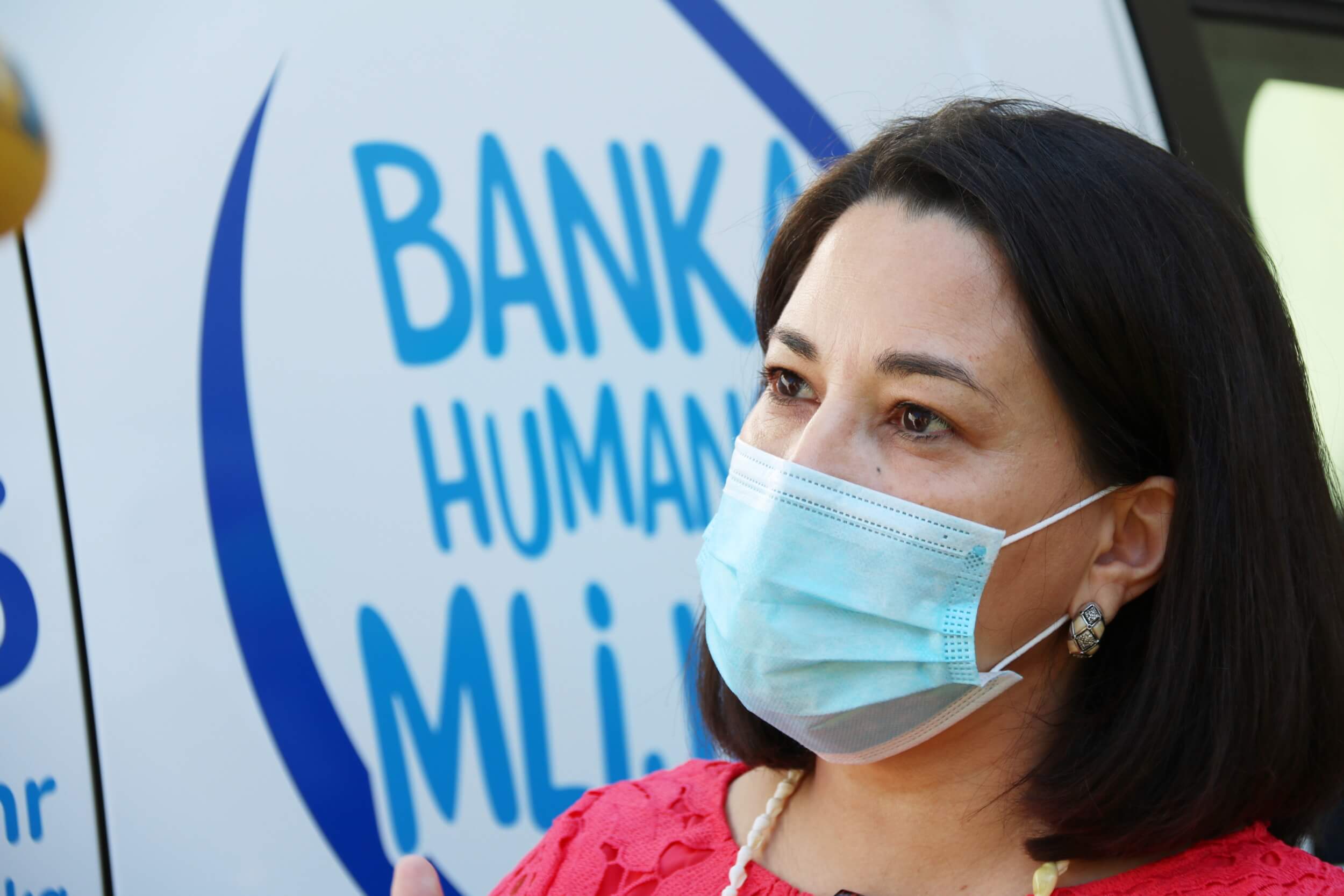
Regina M. Castillo at Human milk bank © Marin Ilej/UNICEF
Still, there are some issues Croatia needs to address and are far from ideal at the moment.
„There are still differences when it comes to access to services for children, depending on where they live and the conditions in which they grow up. Children with disabilities, as well as children from the poorest families, especially in rural areas, often do not have the opportunity to attend kindergarten and do not have the same access to specialized health services and therapies as children in urban areas. The focus of UNICEF in Croatia is on the most marginalized children: children with disabilities or developmental delays, children growing up without adequate parental care, children from minority groups, children at the risk of poverty and exclusion. UNICEF’s programs are focused on the well-being and protection of every child, with a special focus on the most vulnerable children“, pointed out Castillo.
Campaigns and programmes such as “Every child needs a family”, “The first three are the most important”, and “Stop violence among children” are perhaps the most known public action by UNICEF in Croatia, but returning to the good practices of breastfeeding, Castillo emphasizes the establishment of the Human Milk Bank in her current mandate.
„Thanks to the Human Milk Bank, prematurely born and seriously ill newborns (who do not have access to their own mother's milk) can receive milk donated by other mothers. We continually work on reducing the risk of disasters, support the development of quality foster care and provide support to parents in the upbringing and care of children through workshops and we work a lot with young people“, said Castillo.
In general, UNICEF has different types of offices in countries, and regarding the Croatian office, it’s a Country Office. In other words, most of the resources (human and financial) are invested in programs in Croatia. Castillo says that the five-year mandates have priorities that are determined in cooperation with partners. And while 80 percent of the funds raised are invested in programs for girls and boys in Croatia, there are funds and support programs for children outside of the country.
“For example, in 2018, UNICEF supported child health care in parts of Ukraine affected by the conflict and helped the building of five inclusive children's playgrounds in two refugee camps in Jordan in cooperation with the Ministry of Foreign and European Affairs in 2019. Through the ‘Schools for Africa’ program , which includes many kindergartens and schools throughout Croatia, UNICEF supports the education of girls and boys in Madagascar", Castillo listed several examples.

Regina M. Castillo, UNICEF office for Croatia representative with children on Media Literacy days press conference with Radovan Fuchs Minister of Science and Education, Krešimir Partl, State Secretary at Ministry of culture and media and Robert Tomljenović, Deputy Director of the Council for Electronic Media © Marin Ilej/UNICEF
Overall, the UNICEF Office for Croatia works closely with the Croatian Government, and most notably, with the Ministries of Social Welfare, Education, Health, and the Ministry of Foreign and European Affairs. Other partners also include experts (Croatian experts, but also building on expertise and good practice from all over the world), professional associations, academia, services providers, and NGOs.
“UNICEF’s goal is to connect all stakeholders and to advocate and support systemic change for the well-being of all children. System change is a gradual process, and it can be challenging, but when it comes to children’s rights, every step forward is well worth the effort”, explained Castillo.
Croatian citizens showing support for UNICEF
On one hand, Croatia is a good country with low mortality rates of kids and a role model for breastfeeding promotions. On the other hand, however, peer to peer violence (on whose suppression the aforementioned “Stop violence among children“ campaign works heavily on), and unequal approach to education between rural and urban areas show Croatia has both its ups and downs. Unfortunately. The downside sometimes overshadows all the positive things.
One such instance was the tragic death of a two-year-old girl from Nova Gradiška on Easter Sunday. The death of a severely injured girl, who was brought to Zagreb's children's hospital after suffering abuse and heavy beating from her biological parents (and from whom the girl was taken and given to a foster family but was then returned back to biological parents), sparked controversy and citizens outrage, culminating in changes in social welfare law, as well as sacks and investigations in the welfare center in Nova Gradiška.
„We are deeply saddened by the tragic death of two-and-a-half-year-old Nikoll on Easter Sunday. There are no words to express the pain of such a terrible event. Unfortunately, there are no simple and quick solutions to prevent violence against children. For years, UNICEF in Croatia has been continuously and persistently working in the field of child protection, educating experts from the social welfare system, but also other experts who work with children and families, such as experts from the health care, education, and justice systems. UNICEF implements various support programs for parents, and it is fully committed to the development of foster care and the improvement of the legislative framework. However, UNICEF is also aware that society as a whole, has a long way to go to achieve the goal that every girl and every boy is guaranteed the best possible care and protection. UNICEF will continue to work actively, persistently, and dedicatedly with all partners to achieve it”, commented Castillo.
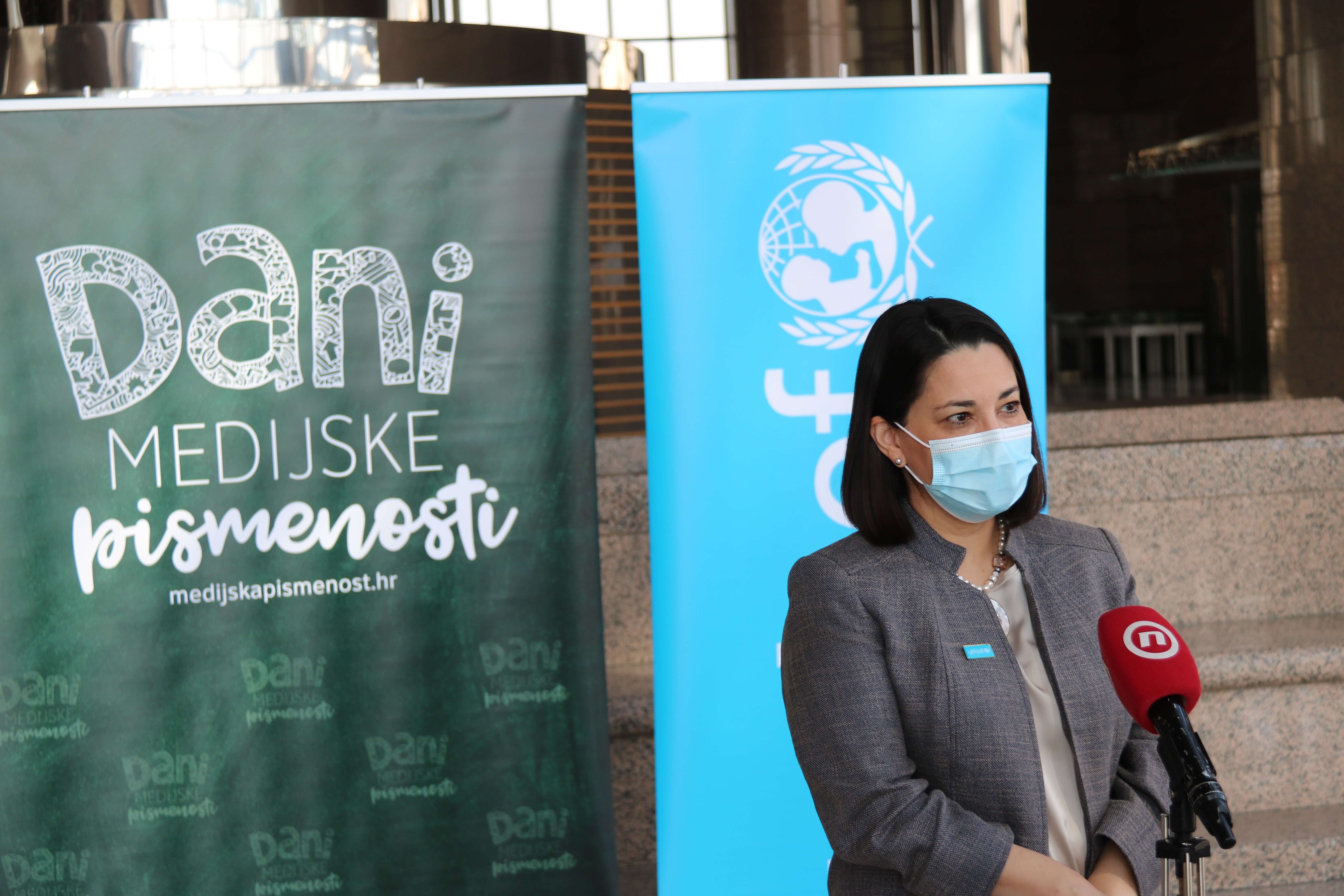
Regina M. Castillo talking on Media Literacy days press conference © Marin Ilej/UNICEF
However, Croatians recognize the importance of the UNICEF mission. Before Covid, UNICEF annually collaborated with the Museum of Illusions on the Museum of Reality exhibition which displayed the problems children faced worldwide, but which also showed what changes and solutions UNICEF brought to those areas.
“Experience tells us that citizens are ready to support the youngest, in Croatia and beyond. Implementation of our programs would not be possible without the support from citizens and companies that placed the focus of their CSR activities precisely on children. We especially value the support from our Childhood Guardians, donors who support our work with regular monthly donations and allow us to regularly conduct our programs for boys and girls, as well as react quickly with much-needed assistance in crisis situations like the earthquakes in Croatia and the COVID-19 pandemic that affected all families. UNICEF is always in the field with the most vulnerable children and their families”, notes Castillo.
In the end is important to note, that while children are recognised as a particularly vulnerable group, all human rights apply equally to children.
“All the rights enshrined in the Convention apply to every child, regardless of a child’s country of origin, gender, religion, and nationality. Every child, by birth, has all his/her rights, the right to grow up in a safe environment, to have a family, to have access to health care and education, to be able to play and develop his/her interests and reach his/her full potential”, concludes Castillo.
The five-year mandate is an agreement that sets priorities in advance, so Castillo warned that there is no opportunity for making donations outside of that framework. UNICEF office occasionally does get messages from citizens who need advice or help on issues outside of that frame, but nevertheless, UNICEF can offer them help by referring them to institutions and addresses that can offer citizens the necessary support, financial support, or information.
With expertise mentioned several times throughout this story as the insurance of delivering the best solutions to issues children face, UNICEF is always on the lookout for new people. If you want to make a change in the world while earning a fair wage yourself, check out what expertise UNICEF is looking for right now.
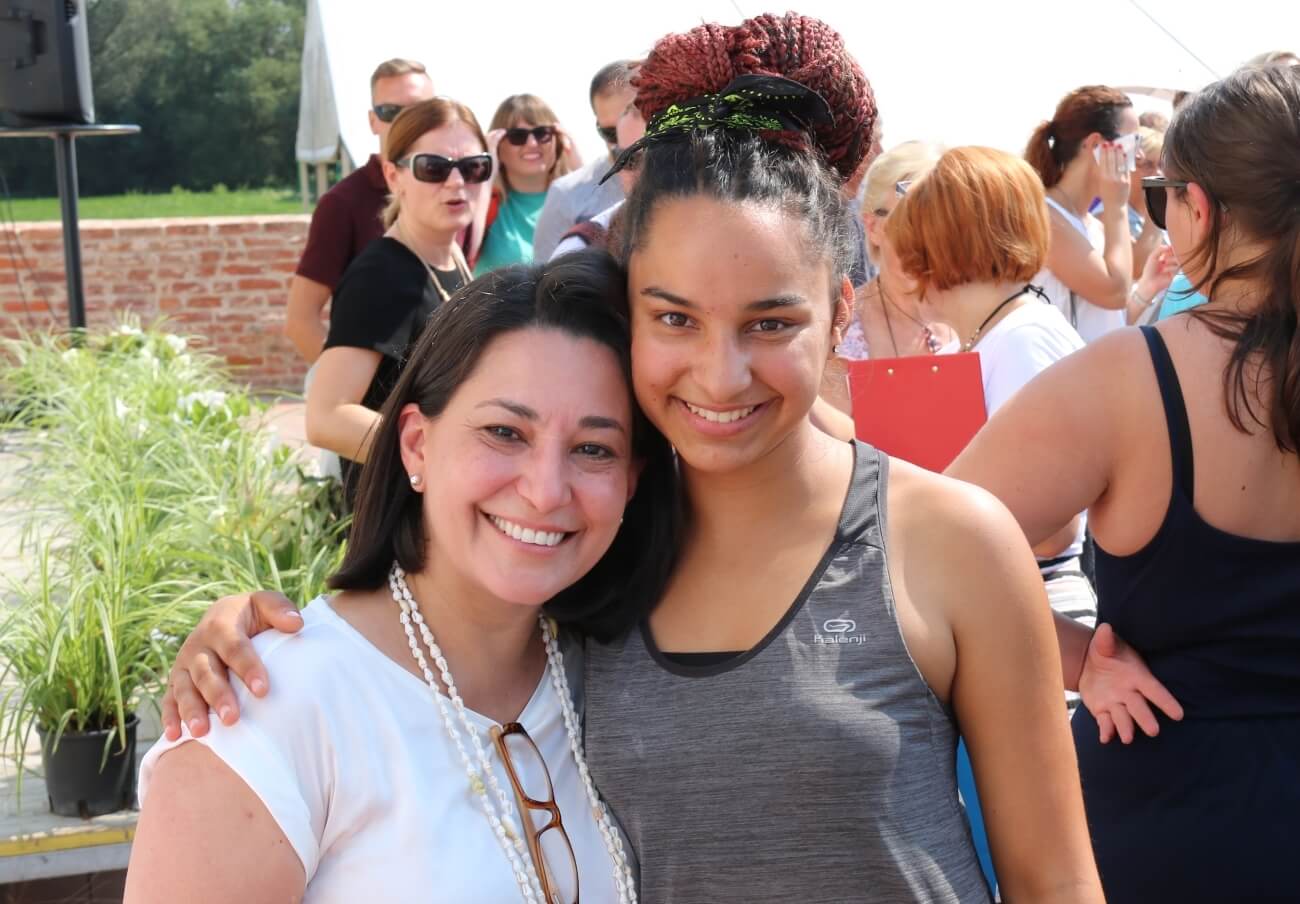
Regina M. Castillo on a foster family gathering © Marin Ilej/UNICEF
UNICEF Croatian Office is situated on Radnička cesta 41/7. To inform the public of their work, they built a considerable presence on Facebook, Twitter, Instagram, Youtube, and Linkedin. You can also find all UNICEF-related info for Croatia on their official website, and contact them via mail: This email address is being protected from spambots. You need JavaScript enabled to view it. or on phone numbers: +385 1 2442 660 and +385 1 2442 661. You can use the website to donate to a cause in Croatia too. Additionally, there are numbers: +385 1 4095 855, +385 99 2692 196, and +385 91 621 1039 for more details on donating to Croatia as well as e-mail address This email address is being protected from spambots. You need JavaScript enabled to view it.. You can also leave a donation to UNICEF in your will, and a phone number +385 1 3031 640 specializes for the issue in Croatia. If you find yourself in Croatia and you want to volunteer for UNICEF, more info can be found by sending a mail to This email address is being protected from spambots. You need JavaScript enabled to view it. and on phone number +385 1 3031 646.
And of course, you can donate for a good cause to UNICEF for any action the fund is internationally involved in.
To read more from the series "Friends of Croatia", follow TCN's dedicated page.
For more about UNICEF in Croatia, follow TCN's dedicated page.
Montenegrin Health Minister Jelena Borovinić Bojović Thanks Croatia For Vaccine Donation
ZAGREB, 25 May, 2021 - Montenegrin Health Minister Jelena Borovinić Bojović said in Zagreb on Tuesday that Croatia's donation of 10,000 vaccine doses was significant for Montenegro's efforts to inoculate its population against COVID-19.
In early May the Croatian government decided to donate 30,000 doses of coronavirus vaccines to Bosnia and Herzegovina and 10,000 doses each to Montenegro and Kosovo.
After meeting with her Croatian counterpart Vili Beroš, Borovinić Bojović thanked Croatia for that "big friendly gesture and great solidarity."
The donation of 10,000 doses will be "very significant in the process of mass inoculation that is currently underway in Montenegro," she said.
Croatia's Health Minister Vili Beroš underscored that Croatia's care for its neighbouring countries.
"I hope that we will contribute at least a little in the fight against this disease," said Beroš.
The two ministers discussed cooperation in the transplantation programme with Borovinić Bojović underscoring that Croatia has "shown especially good will to help us in resolving that problem."
She added that they discussed the signing of a memorandum of understanding that would enable Montenegrin doctors to come to Croatia for further training regarding transplantation surgeries.
The Croatian transplantation programme has been recognised beyond the borders of our country, said Beroš.
He underscored Croatia was willing to help Montenegro in that regard.
For more about politics in Croatia, follow TCN's dedicated page
PM Andrej Plenković: Decision on Croatia's Entry to Schengen Area Possibly in Second Half of Year
ZAGREB, 24 May, 2021 - Croatia hopes its entry to the Schengen area of passport-free travel could be put on the agenda during Slovenia's EU presidency in the second half of this year, Prime Minister Andrej Plenković said on Monday.
"I believe it is possible. We have excellent overall relations with Slovenia and it would be great if that happened during Slovenia's presidency of the Council of the EU," Plenković told reporters.
Plenković discussed Croatia's accession to the Schengen area and the euro area with European Council President Charles Michel and Home Affairs Commissioner Ylva Johansson.
Both the previous and current European Commission have confirmed that Croatia has met all technical criteria to enter the Schengen area and it is now up to the member-states, that is, the Council of the EU, to make a political decision on the matter.
Asked if he expected problems from some member-states, Plenković said that Croatia had succeeded in showing its partners through dialogue that it had met all criteria.
"I believe that we are heading towards a positive decision by the Council," he said.
The EC has said that on 2 June it will announce a new strategy for the Schengen area and two bills on changes to the Schengen evaluation mechanism and the Schengen Information System.
As for Croatia's other strategic goal, entry to the euro area, Plenković said that talks were underway with Executive Vice-President Valdis Dombrovskis and that Croatia could soon achieve that goal as well.
"I believe that we will manage to join the euro area in the next two years," said Plenković.
The Croatian PM and European Council President Michel discussed also the situation in Southeast Europe, notably Bosnia and Herzegovina.
Plenković said that Croatia supported its neighbours' European ambitions, underlining the need to amend Bosnia and Herzegovina's election law so that it could enable parliamentary elections in 2022 and be fair for all constituent peoples and other citizens.
For more about politics in Croatia, follow TCN's dedicated page.
President Zoran Milanović For Seeing to Croatian Interests When Sending Troops To international Missions
ZAGREB, 14 May, 2021 - President and Armed Forces Supreme Commander Zoran Milanović said on Friday that Croatian interests would always be taken into account when sending Croatian troops into international missions.
The Croatian army is the modern army of a democratic state, a state of equal citizens, which participates in international missions, Milanović said in Petrinja at a ceremony marking the 30th anniversary of the 2nd Guard Brigade Gromovi.
"You too will participate in international missions. In deciding where, when and in what composition we will go, we will take account of first and foremost protecting Croatian interests," he said.
Croatian troops will go into those international missions where they can learn, work on themselves and build their careers, he added, "where we won't meddle too much in others' conflicts and others' quarrels."
To the soldiers sworn in at Petrinja today, Milanović said that as soldiers and professionals they should work on their physical fitness, knowledge and education every day.
"We see how wars are waged today, how the world is stirring and what changes are taking place in front of us. This is not an ordinary time and we must always be adapted to this time, taking account of knowing clearly what our interests are, how far we can go, what we can't pass over and how much we can set aside for that."
In that sense, Milanović said, the Croatian army must be properly equipped.
Defence Minister Mario Banožić said 203 Gromovi members were killed in the Homeland War's operations Storm, Flash, Maslenica, Una and others, while five were unaccounted for and 1,200 were wounded.
Despite that, nothing could stop their courage and heart, he added, announcing the modernisation and development of the military.
For more about the army in Croatia, follow TCN's dedicated page.
"Croatia to The World" Exhibition Could Be Shown in Diplomatic Offices
ZAGREB, 14 May, 2021 - The fantastic exhibition "Croatia to the world" represents the best that Croatia has contributed to the world and it would be good if it were shown in diplomatic offices abroad to help to break down stereotypes, Foreign Minister Gordan Grlić Radman said on Friday.
He was accompanying diplomats accredited in Croatia who were visiting the exhibition at the Meštrović Pavilion. The exhibition honour 38 greats linked to Croatia whose work left a deep trace on humankind. Apostolic Nuncio Giorgio Lingua, doyen of the diplomatic corps, thanked the minister on their behalf.
"In order for the exhibition to be visible, it would be good if it were shown, for example, in Budapest, Berlin, Rome," Grlić Radman told the press.
That would help to break down the stereotypes about Croatia, which is often seen as a country of athletes, footballers, the most beautiful sea, nature and such, he said.
Today's visit was an opportunity for diplomats to get to know the many things they use every day without knowing who contributed to their creation, said Archbishop Lingua. "This is a good opportunity to see how much Croats have contributed to many fields in the world."
"The exhibition is an introduction to the unimaginable wealth of the Croatian cultural heritage," said Grlić Radman. It is dedicated to "extraordinary minds" linked to Croatia by birth, education or activity, he added.
The exhibition is dedicated to individuals whose work influenced global processes, changed the world or influenced global history, the minister said, such as inventor Nikola Tesla, presented as the man "who discovered the 20th century," or Nobel winners Lavoslav Ružička and Vladimir Prelog, or "the father of forensics" Ivan Vučetić.
Archbishop Lingua said he was pleased that today's visit was an opportunity "to see the world through Croatian eyes."
For more about diplomacy in Croatia, follow TCN's dedicated page.
FM Gordan Grlić Radman Says Croatians in Israel Are Safe
ZAGREB, 14 May, 2021 - All Croatian citizens in Israel are safe, Foreign and European Affairs Minister Gordan Grlić Radman said on Friday, and expressed solidarity with the families of the civilian victims on all the sides and called for the de-escalation of the Israeli-Palestinian conflict.
On 12 May, Croatia called on all the parties in the Israeli-Palestinian conflict to refrain from any action that would lead to escalation of violence, in which dozens of people have been killed so far, including civilians.
"There is no justification for attacks on civilians," the Croatian Ministry of Foreign and European Affairs said in a statement last Wednesday, calling on all leaders to help de-escalate the conflict.
Grlić Radman said today that so far Zagreb was in permanent contact with the Croatian Embassy in Israel and was kept informed on a regular basis.
None of the Croatians in Israel have asked for assistance, he added.
It is most saddening that civilians are among the casualties. We extend our solidarity with the families of civilian casualties, and we appeal to all parties for defusing the tensions, the Croatian minister said.
The Middle East crisis has always been very sensitive, and those developments can simply spill over to some other regions, Grlić Radman said.
The European Union with its partners, including the USA, keep calling for multilateral action, he added.
"It is in the interest of all to have a sound, stable, peaceful global order, based on the respect for international and human rights," he said.
Grlić Radman said he did not believe that the USA was insufficiently engaged in that region and he believes that the Joe Biden Administration will make some headway in that regard.
Commenting on the fiercest fighting between Israel and the Palestinians in the last few years, President Zoran Milanović said on Thursday that the USA should define its foreign policy more clearly, noting that the new US energy policy was making that part of the world less interesting than it was before.
"I look at the American position. Israel is defending itself, but is also attacking. (...) The Americans will have to better define their foreign policy and make it clearer," Milanović said yesterday.
Unlike his predecessor Donald Trump, President Joe Biden has distanced himself from the Middle East, but is now aware that he cannot distance himself completely, he said.
"That part of the world is ceasing to be interesting as it used to be because of the US energy policy, notably because of this administration, which is much more focused on renewable sources and less on oil, on hydrocarbons which America now produces in sufficient quantities on its own. So the question is, what is their strategic objective in the Middle East other than being a policeman?" Milanović said. "These are extremely important issues that put us in a moral dilemma."
For more about diplomacy in Croatia, follow TCN's dedicated page
Friends of Croatia: Ministry of Foreign and European Affairs - The Croatian Side of Diplomatic Relations
May 13, 2021 - The fourth article in the series "Friends of Croatia: Ministry of Foreign and European Affairs" takes a look at the Croatian diplomatic relations from the perspective of the appointed ministry for diplomatic questions and foreign relations.
It takes two to build a friendship. While this series focuses on conversations with ambassadors, diplomats, and representatives of international organizations in Croatia, what is the official take on diplomatic relations and diplomacy from the Croatian side?
The Ministry of Foreign and European affairs (currently run by minister Gordan Grlić Radman) is the branch of the Croatian government that is the first and foremost point of contact and communication with the international community. If you are a country that wants to have diplomatic relations with Croatia, this is the ministry to reach.
„If diplomatic relations have been established between two countries, the sending country expresses the intention of opening a diplomatic mission (Embassy) to the receiving country, in this case, the Republic of Croatia, with a verbal note and seeks the consent of the competent institutions of the Republic of Croatia“, explained the Ministry the process of establishing Embassies.
„The competent authorities of the Republic of Croatia carry out the procedure of issuing the consent for the opening of a diplomatic mission and, upon its completion, inform the sending country about the outcome by verbal note. If the decision on giving consent for the opening of the Embassy in the Republic of Croatia has been granted, the sending country can start searching for a location to accommodate the Embassy and start the procedure of appointing an Ambassador," the Ministry added.
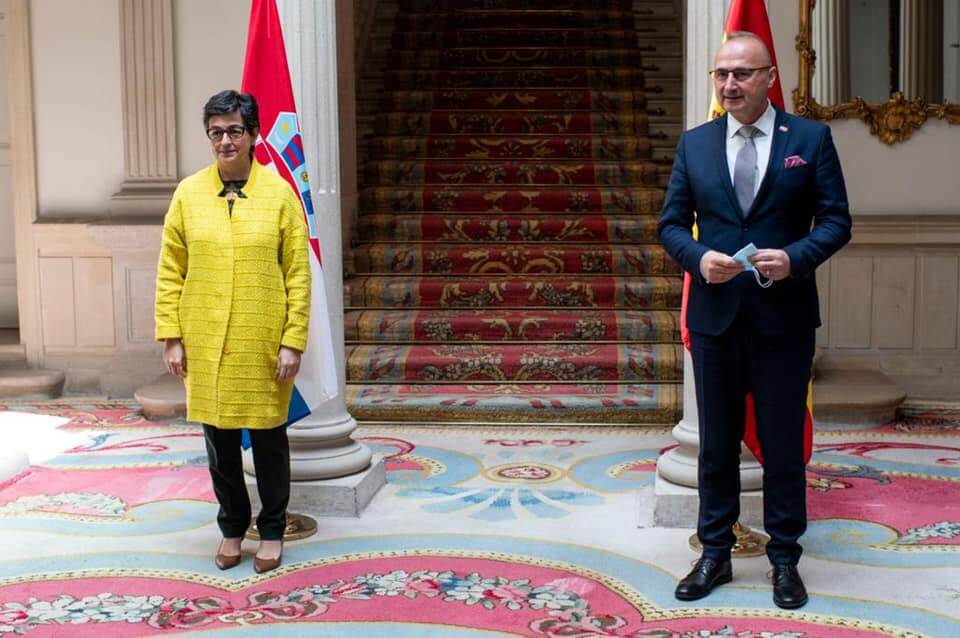 Foreign Minister Gordan Grlić Visiting Spain © Ministarstvo vanjskih i europskih poslova
Foreign Minister Gordan Grlić Visiting Spain © Ministarstvo vanjskih i europskih poslova
With this procedure in place, concluding with 2021, Croatia has 56 resident Embassies, 67 non-resident Embassies, 4 Consulates General, 3 Representative Offices of the bodies of the European Union, 8 Representative Offices of international organizations, and 103 Consulates General/Consulates/Vice-consulates (which what is interesting, as the Ministry pointed out, are handled by honorary consuls who are mostly Croatian citizens).
„Resident Embassies can be based only in the capital city, and they are headed by an ambassador. Non-resident Embassies are located outside the state, with a seat in some other country, usually, an EU member state, while Consulates Generals can be located in other larger cities besides the capital and are headed by general consuls and responsible for their work to the Embassy of the said country“, explained the Ministry.
Croatia may be a young county with 30 years of sovereignty, but the tradition of its diplomacy is traced deep in history. Most notably, in the Dubrovnik Republic, a role model to Croatian diplomats even today.
„Croatian diplomats take pride and inspiration in the tradition of diplomacy of the Dubrovnik Republic. As a small country, surrounded by powerful empires and influential Mediterranean city-states, with no military force, the Dubrovnik Republic was able to preserve its foreign policy sovereignty mainly thanks to the diplomatic skills and the awareness of its geopolitical position. These very qualities are constantly a source of inspiration for those who defend the interests of the Republic of Croatia on the modern world's stage“, explained the Ministry.
As is evident by following the work of the Ministry of European and Foreign Affairs, Croatia takes its diplomacy very seriously, and of course, with some countries, this is more evident than in others. One of the most recent examples was with Egypt. At the end of March, as TCN reported, Croatia showed solidarity with Egypt donating 100 books, and additionally, Croatian companies expressed interest in doing business on the Egyptian market.
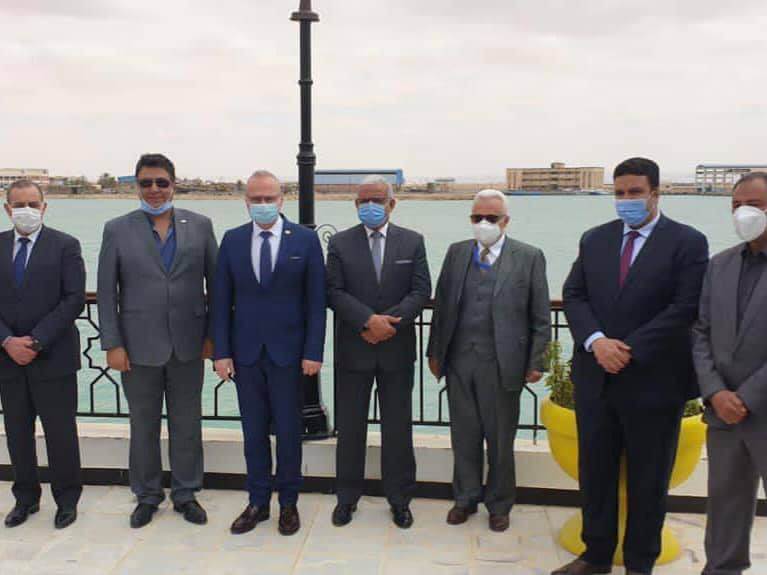
Foreign Minister Gordan Grlić in Egypt © Ministarstvo vanjskih i europskih poslova
„Minister Grlić Radman’s visit to Egypt was very successful, with his Egyptian counterpart Minister Shoukry opening a business forum which was attended by more than 120 Egyptian and Croatian business people“, said the Ministry, adding that representing the interests of Croatian companies and Croatian economy, in general, is an important task for Croatian diplomacy“.
Companies can ask for help by contacting the Ministry, specifically the Directorate General for Economic Affairs and Development Cooperation, or the Croatian embassy in the country of interest directly. No matter which way the request is made (regardless of whether the company has contacted the Ministry or the Croatian embassy in the country of interest directly) the company is kindly asked to fill out a request for support to the exporter, available on the economic diplomacy webpage. Within a couple of days, the company will receive a proposal for the realization of its request or an invitation to a meeting to discuss it jointly in more detail. All requests of exporters are recorded in a database that can be accessed by all employees of the Ministry in Zagreb and abroad in charge of economic affairs and through which the status of the case can be monitored“, explained the ministry the process of stepping on the market in more details.
Embassies in Croatia that are in frequent contact with the Ministry are there for their citizens when visiting the country, but also, the Ministry welcomes Croatians to contact the Embassies for questions regarding traveling to other countries.
„Croatian nationals can obtain more information on entry requirements, COVID-19 restrictions, possibilities of obtaining residence permits or visas, and other types of information about a specific country. Also, Croatian students who are interested in studying or continuing their education abroad can get more information about the educational system and ways of applying for scholarships through foreign Embassies“, said the Ministry.
While the Ministry has no intention of stealing the jobs of the Embassies (such as providing consular assistance), they are at service if needed.
„Croatia is a popular tourist destination, so the Ministry of Foreign and European Affairs recognizes the importance of communication with all foreign nationals who are interested to come and visit us. The Ministry provides information related to e.g. entry requirements, COVID-19 restrictions, the possibility of issuing the residence permits or visas, as well as all other types of information for foreigners who want to visit us as tourists or become residents“, concluded the Ministry.
The Ministry of Foreign and European Affairs is located in Zagreb, at Zrinjevac 7-8.
You can learn more about their work and all things travel-related at their official website and you can also follow them on Facebook, Twitter, Youtube, and Flickr. The phone numbers of various branches within the ministry can be found here.
To read more from the series "Friends of Croatia", follow TCN's dedicated page.
For more about diplomacy in Croatia, follow TCN's dedicated page.
Croatia Calls On All Parties to Israeli-Palestinian Conflict to Refrain From Violence
ZAGREB, 12 May, 2021 - Croatia has called on all parties to the Israeli-Palestinian conflict to refrain from any action that would lead to escalation of violence, in which dozens of people have been killed so far, including civilians.
"There is no justification for attacks on civilians," the Croatian Ministry of Foreign and European Affairs said in a statement on Wednesday, calling on all leaders to help de-escalate the conflict.
According to the Health Ministry in Gaza, over 30 Palestinians have been killed, including women and children, since clashes between Palestinian worshippers and Israeli police at the Al-Aqsa mosque in east Jerusalem escalated into fighting. According to Israeli sources, six persons have been killed in Palestinian rocket attacks.
The military conflict between the Palestinian movement Hamas and Israel flared up on Tuesday evening after Hamas showered Tel Aviv with rockets and the Israeli military responded with air strikes against the Gaza Strip.
The international community has called for peace, while Muslim countries have deplored the worst escalation of violence between Hamas and Israel in recent years, prompted by the clashes in east Jerusalem.
For more about politics in Croatia, follow TCN's dedicated page.


